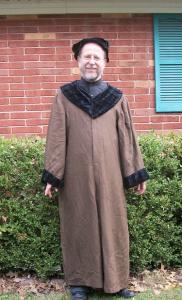“Drag” versus “draw” – which way would be the best word to translate what Jesus says when he says in John 6:44, “No one can come to me unless the Father who sent me draws him”? And what are the implications for what we believe about God and how God operates? Does God sweet-talk us or persuade us into faith? Or does God drag us into belief, kicking and screaming, against our will?
The word Jesus uses in John 6:44 is the word helkō, which can mean either “draw / attract” (like a magnet) or “drag.” The word is used eight times in the New Testament. The best example where the word arguably means “draw” rather than “drag” is John 12:32, where Jesus says that when he is crucified, “I will draw all people to myself.”

Otherwise, the New Testament meanings of this word all lean toward “drag.” In John 18:10, the word is used to describe Peter pulling his sword out of its sheath. In John 21:6, the disciples are barely able to “drag” in the net because of the huge catch of fish (see also 21:11). In Acts 16:19, the owners of the fortune-telling slave girl “dragged” Paul and Silas into court. In Acts 21:30, the mob “dragged” Paul out of the Temple, intending to lynch him. And in James 2:6, James argues that it is the rich who “drag” his readers into court. None of these examples can be easily taken to mean persuasion or attraction rather than pulling by force; indeed, the dragging is done against people’s will, wherever people are involved.
The word helkō is used 34 times in the Septuagint, with similar results to be found (it is used six times there for “drawing” the sword), although the Septuagint gives us more examples that could be taken in a non-drag sense. For example, in Nehemiah 9:30, Nehemiah says that God “coaxed” them and warned them by his Spirit through the prophets. 4 Maccabees 14:13 speaks of parental love for one’s children that “draws everything toward sympathy from the inmost parts.” 4 Maccabees 15:11 speaks of such parental love “drawing the mother to suffer along with her children.”
Psalm 10:9 (= 9:30 in Greek) speaks of the villain who lies in secret and catches the poor “when he draws them into his net.” Both Psalm 119:131 and Jeremiah 14:6 speaks of “drawing” one’s breath; 3 Maccabees 5:49 speaks of babies at the breast “drawing” their last bit of milk. In Song of Solomon 1:4, the girl says to her beloved, “Draw me away after you!” Wisdom 19:4 says that the fate that the ungodly deserved “drew” them to a nasty end. Finally, in Jeremiah 31:3 we read, “I have loved you with an everlasting love; I have drawn you unto mercy.”
Such is the evidence from Biblical Greek. One may read the examples identified above as either “draw” or “drag.” Out of the 42 times that the word in question is used, 22 of them are unquestionably “drag,” ten do not lend themselves to either meaning, and only ten have any chance of being taken to mean “draw.” So Jesus’ words can best be translated, “No one can come to me unless the Father who sent me drags him.”
Much as we like to think of God sweet-talking us or gently attracting us into faith, the truth is that God has to drag us there. We have an approach / avoidance problem with God. We are like the man possessed by the legion of demons, who comes running to Jesus, but who screams for Jesus to leave him alone. Part of him yearns to be set free from bondage, but part of him is terrified. Indeed, even the bystanders in this account are terrified with this Jesus – instead of asking him to stay and set them free, they ask him to leave their neighborhood. Yes, elsewhere the crowds followed Jesus, and the tax collectors and sinners were drawn mysteriously to him, but at the cross, all abandoned him but a handful of women who had nothing more to lose.
We are like Lot, who cannot bear to leave Sodom, despite the fact that he knows it is about to be destroyed. The angel grabs him by the arm and drags him out of town – and don’t miss the words, “The Lord was being merciful to him.” When God overpowers our free will and drags us into faith, like Saul when he was struck down on the Damascus Road, God does so in mercy.

As a believer in the Reformed tradition, the doctrine of irresistible grace (which is what we’re talking about) is positive and reassuring to me. God drags us into faith, and we can’t throw it away. We in the Reformed brand of faith are totally pessimistic about our ability to choose God or do the right thing, unless God drags us into doing so. I have no faith in my own human ability. Ask anyone who’s been through a Twelve-Step program, and they’ll tell you: freedom from bondage comes only when we surrender to a Power higher than ourselves. Human ability will never choose God on its own.
The Reformed tradition has its own nagging, unresolved questions. What part does free will play? Are we just robots? How can we be held responsible, if God is pulling virtually all of the strings? What about those who fall away from faith? Whether one sides with the Reformed approach or with free will, both models require us to stretch one or more of the puzzle parts to make the rest of them fit. To me, the Reformed tradition gives me the most comfort. I just don’t have that much faith in my own goodness or capacity to choose God. I’m glad that God made the inexplicable choice to drag me into faith.











